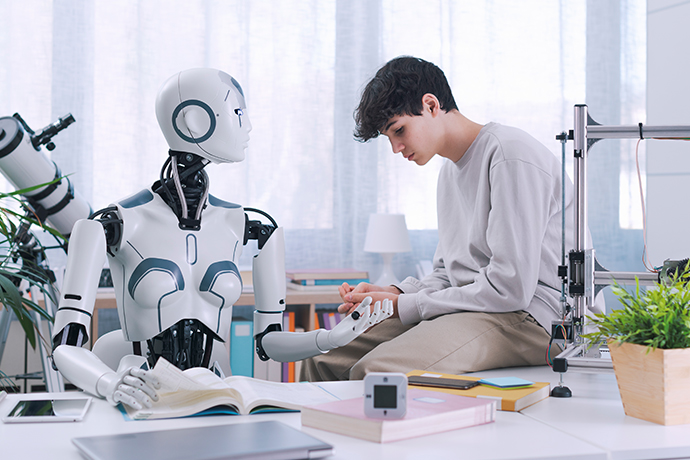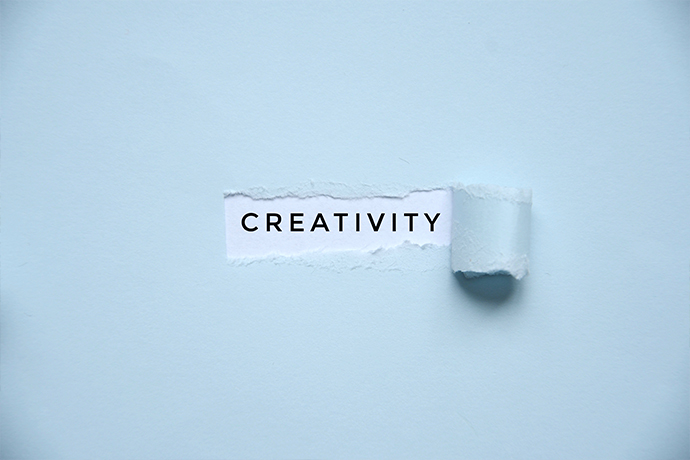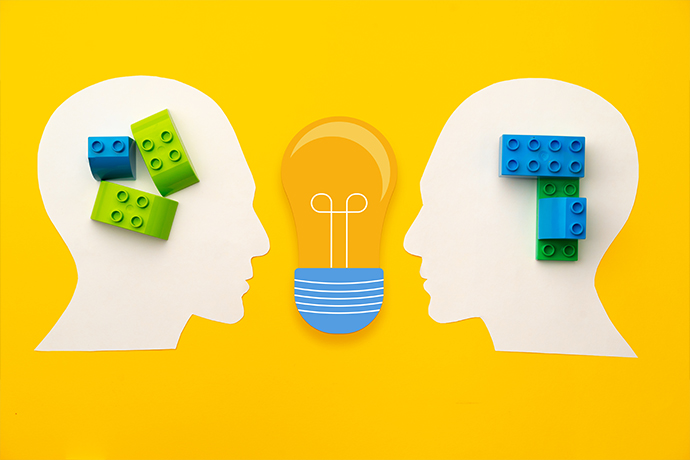 SPEAKERS
SPEAKERS
 TOPICS
TOPICS
Will AI replace human creativity? Explore the unique strengths of human innovation vs. machine intelligence and the future of AI-human collaboration.

As AI enters all aspects of our lives, will it ever replace our creativity and spirit of innovation? Read on, as we explore what creativity means from a human and AI standpoint, and which is superior.
Artificial Intelligence (AI) is everywhere, with new tools, breakthroughs, and capabilities emerging at lightning speed, impacting every aspect of work and life.
As human beings, we are slowly adapting to AI and integrating it into our lives. At the same time, these AI developments are raising many questions.
Given that we are known for our creativity and innovation skills, is AI a threat to human creativity? Or worse, can AI replace human creativity?
We’ll explore the difference between human creativity and AI to better understand where we are today and whether AI will destroy human creativity in the future.
For starters, let’s understand what innovation and creativity are.
In simple words, creativity is an original thought that can lead to new ideas, products, and possibilities that don’t exist currently. Research shows that creativity occurs when there is coordination in the cognitive control network of the brain. This means there are multiple pathways within the same brain, and the pathway an individual takes for a specific creative idea depends on the situation and their expertise.
It goes without saying that creativity is unique, and no two individuals can have the same neural path. In this sense, creativity makes every human unique and gives a perspective that can never be replicated.

Artificial intelligence, as the name suggests, is a replication of human intelligence through existing data.
Essentially, AI was built by humans to process and analyze high volumes of data that have been created by humans. What could take us months or even years to analyze can be done by these machines within minutes because of their exceptionally high processing and computing power.
But that’s not all. It can also identify new insights from the existing data, and even create different forms of content by making an intelligent guess as to what will fit the context. This is the essence of AI creativity.
Now that we know what creativity means in both humans and AI, let’s compare them.
Human creativity is original and unique. The output depends on factors like an individual’s expertise, life experiences, environment, upbringing, education, personality, and more. On the other hand, AI takes in existing data that has been created by humans and comes up with creative outputs. Since they are largely based on algorithms, tweaking them or changing the input datasets can generate new ideas.

In the current state, AI cannot replace human creativity due to the following reasons.
The first reason why human creativity will rule is due to the presence of emotional intelligence, also known as Emotional Quotient (EQ). This is the ability to identify emotions such as happiness, sadness, and respond accordingly.
This EQ gives humans an advantage because we can better understand what’s in the minds of our fellow species. AI, on the other hand, can only make a calculated guess based on verbal and written interactions with humans, and this may not always be accurate.
As mentioned earlier, creativity is unique for different humans and even across different situations for the same individual. Machines will not have this uniqueness, especially if multiple AI platforms are given the same datasets as inputs. Though the way of expression may change and the processing speed can vary, it is hard for machines to generate unique ideas every single time.
Humans are unpredictable at best. No two humans react in the same way to a given situation. Sometimes, the same person may react differently on different days to the same situation.
Despite this unpredictability, we have coexisted for many centuries simply because we can understand these differences and still connect with others.
Machines, in comparison, seem distant and cold, as we can’t connect with them emotionally yet. This human connection also shapes the way we think and generate ideas.
Closely associated with human connections and EQ is the ability to make judgments.
Again, depending on the situation and the audience, we can change ideas and how we present them. Also, we can adapt to specific responses from the receiver. All these outcomes are a direct result of our ability to judge others. AI is incapable of making these accurate judgments.
Due to these differences, AI cannot replace human creativity, and machines will never replace innovators. However, humans can leverage the power of AI to improve their productivity, brainstorm ideas, and refine their ideas.
AI has many advantages, like high processing speeds, the ability to detect patterns, generate output in specified formats, and more. Going forward, these advantages are only going to increase because we are now inventing more powerful infrastructure and chips that power AI.
We can combine the power of AI with our originality and creativity to build new products that can positively benefit society. Already, this AI human creativity and collaboration have led to the emergence of breakthroughs in scientific discoveries, especially in the pharma world. As we work closely with AI, we are sure to come up with more such technological and scientific advancements that can enhance our quality of life.
To conclude, AI will never replace human creativity because it does not have the uniqueness, EQ, or innate connections that we share with other members of our species. However, they can make us better at work and in life, leading to a better world than we know today.
The best way forward is to use the power of AI to increase our capacity and brainpower. Eventually, it can lead us to innovate quickly and make the world a better place for everyone.
To learn how to use AI to your advantage and boost creativity, reach out to our experienced AI speakers. These leaders work extensively in the AI human creativity space and can offer a human touch to explain the power of AI.
We can also create training programs that meet your specific needs.
Contact us today to learn more.